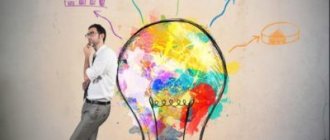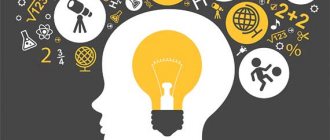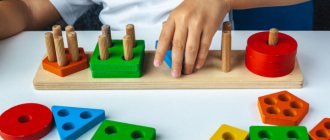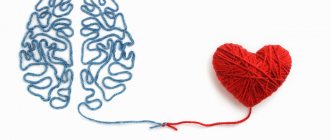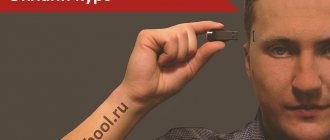Ability to analyze: different tasks - one goal
Ability to analyze information reflects the ability to analyze data, examine it, compare it, and draw conclusions. To identify the level of development of analytical abilities, assessment tests are used, the results of which do not depend on subjective factors.
Testing consists of the following tasks:
- verbal;
- numeric;
- brain teaser;
- understanding the basics of mechanics.
The candidate is required to perform analysis of numerical, verbal or abstract information. The test result reflects his ability to work with numbers, texts, images, and perform mathematical and logical operations
. Verbal, numerical, and logical tasks determine the level of proficiency in logic or mathematics, and each correct answer increases the value of the test taker in the eyes of the employer.
The analytical thinking test is used to select the strongest candidates for employment. Recruiters use cases and conduct interviews, but ability testing gives the most objective result, eliminating bias towards the applicant.
Modeling
Adults often have no time to engage in their own development. In such cases, modeling will help. It allows you to train your thinking in a short period of time, while solving important problems. You can use the method even on the way to work or while taking a shower.
How to apply it:
- Select one of the existing problems that could not be solved earlier.
- Try to quickly find all the options for solving it, and then stop at one.
- Think thoroughly about the problem (why it appeared, whether it needs to be solved, what consequences may arise, whether there will be advantages from eliminating it).
- Make a final decision.
- Perform a detailed analysis, calculating the likely outcome of events when implementing the chosen solution to the problem.
Developing analytical thinking in this way allows you to achieve good results. However, to do this you need to be able to focus on one thought and bring all your affairs to the end. In this case, you will need to allocate enough time to think about decisions.
Analytical abilities
Every person has developed logical thinking in one form or another, but the level of its development varies. There are people who are prone to intuitive decisions, and there are those who think about every step for a long time. People who are prone to analysis are said to have an analytical mind. You can find out the level of development of your abilities using free online tests for an analytical mind.
“Psychologists and HR people view analytical skills as the ability to think through a specific situation and propose an appropriate solution. A person with a logical mindset studies the causes and consequences of his or other people’s actions, draws conclusions and conclusions.”
The analyticity test is designed to identify these features, and not only the employer, but also the respondent himself benefits from this.
Analytical thinking in psychology
Mental operations in psychology are a property of the psyche and reflect a person’s subjective connection with the surrounding objective reality. Discursive or analytical thinking is a subtype of abstract-logical thinking, which is based on deep awareness, unfolded in time and is characterized by the stages:
- “Scanning” or understanding an event, situation, problem. An important component at this stage is the person’s high motivation to resolve the situation.
- Review options, process information and set goals. All possible parameters for the solution are identified.
- Proposing hypotheses.
- Ways to solve a problem situation: using previously known, familiar algorithms or creating a new solution.
- Process in action (practical activity).
- Testing hypotheses.
- In case of ineffective solution to the problem, a period of detachment and search for new solutions.
What does it look like
Testing for information analysis includes verbal, logical and numerical sections.
Numerical examples
are used to determine the ability to operate with numbers and make simple calculations (percentages, fractions, proportions).
An example of a test for analyzing numerical information:
Go throughGet ready
Verbal tasks
consist of a short text (100-150 words) and a statement. The applicant is required to determine whether the given statement is “false” or “true.” Texts on medical, scientific, legal or economic topics are used. One text is given 30-60 seconds, so it is not easy to determine whether the specified statement corresponds to the text.
Example of a verbal reasoning test:
Go throughGet ready
Logical or abstract logical problems
consist of a series of abstract images. The pictures depict geometric shapes changing according to certain patterns. Geometric shapes rotate around an axis, and other shapes, lines, and points are added to them. The test taker’s task is to determine the logical connection and find the correct answer from 3-5 options.
An example of a logical analysis test:
Go throughGet ready
Another analytical test used is mechanical understanding, which requires knowledge of basic physical laws and cause-and-effect relationships.
Example of a mechanical analysis test:
Go throughGet ready
comment
The applicant may work worse with texts than with mathematics or physics, but the final test result will show his overall level of ability to analyze information.
How to Determine a Technical Mindset
Psychologists define the mathematical mindset of practicing psychologists in an unusual way. The tester suggests clasping both hands and leaving them in that position.
Researchers believe that the right hemisphere of the brain works in the area:
- intuition;
- visualization;
- creativity.
The left hemisphere works in a different mode:
- logic;
- sequences;
- analysts.
Each person has both hemispheres working. But still one thing always prevails somewhat. According to the theory, if the thumb of your right hand is in the lock of clasped hands on top, this means that your left hemisphere is working more. That is, your logic is stronger than intuition, your mentality is technical.
If the test person’s left thumb were on top of the woven lock, this would mean that the right hemisphere, which is responsible for imagery and creativity, is working more.
Another easy way to determine which hemisphere works better for you. To do this, you need to imagine that you are taking aim to shoot from an imaginary pistol. Notice which eye is squinted? If your right eye remains open, it is the dominant one, which means your left analytical hemisphere works better. If the left eye remains open, the right creative hemisphere is working.
Who needs analytical skills?
An analytical mindset, that is, a predisposition to reflection and logical conclusions, is useful in everyday life and at work. However, there are professions for which developed analytical thinking is a primary skill. This is usually:
- sales department employees;
- economists;
- accountants;
- IT;
- marketers;
- logisticians;
- engineers;
- consultants.
Every position that involves processing data and studying documentation requires information analysis abilities. Some companies use analytical thinking tasks, aptitude tests and potential testing for personnel changes.
Sample questions
Examples of tasks for analytical skills
| Question | Answer options |
| Continue the number sequence: 1; 2; 3; 5; 8; 13; 21; 34; ? | 1) 21 2) 34 3) 55 |
| Astronomers' studies show that the number of planets suitable for the development of life in our galaxy is less than calculated, but even so their number is estimated in hundreds of millions. The search for potentially habitable planets will be conducted around stars similar to our Sun. Claim: Astronomers have found hundreds of millions of habitable planets in our galaxy. | 1) Statement True 2) Statement False 3) Not enough information |
First question
refers to the simplest logical problems. The answer is “55”. This is the next number in the Fibonacci sequence.
Second question
refers to verbal. The correct answer is: “Insufficient information.” From the context it is clear that astronomers did not find specific planets, but identified a certain pattern.
Literature
Great benefits can be gained from reading good literature. People who read a lot stand out from others with their erudition, the ability to speak beautifully, a wide vocabulary, and also success. With the help of books you can even influence the quality of analytical thinking. Moreover, there is no need to read complex specialized literature, because You can train such skills with the help of works of art. But this does not mean that you should abandon popular science books. What books should you read to develop analytical thinking:
- “Engineering Heuristics” (D. Gavrilov) is a book about thinking that helps you learn to think correctly, solve complex problems, and draw conclusions.
- “Logic and tactical thinking” (C. Phillips) - allows you to qualitatively train your brain to correctly solve any issues.
- "Book of Solutions. 50 models of strategic thinking" (M. Krogerus, R. Tscheppeler) is a book that helps you find solutions in any situation.
You can also read other books that talk about the capabilities of the brain and thinking or suggest solving complex problems
From fiction it is worth paying attention to the works of R. Bradbury, A
Christie or A.C. Doyle. All of them will help in developing analytical skills and discovering new talents.
While reading fiction, you should analyze the actions of the characters and also think about why they did what they did. Additionally, you can think about how events would have developed if the character had acted differently.
Tips for passing
Logical thinking is useful for engineers, marketers, auditors and programmers. Companies use the ideation test to select the best employees in the market and form a talent pool. If an applicant receives a weak result on standard numerical or verbal tasks, it will be difficult for him to compete for the vacancy.
- Practice.
With each problem solved, the skill improves, eventually reaching automaticity. The more examples the applicant solves, the better. For this purpose, training tests have been created, in which they train online, comparing their results with the results of other users. After completing the training test, each task is given a detailed commentary on the solution, and advice on how to pass such tasks. - Studying information.
Companies use online analytical tests from different developers. For example, Talent Q uses an adaptive principle for generating tasks. The complexity of the next question depends on how correctly the respondent answered the question. Information about what tests are expected of candidates in a particular company is sought on specialized forums on the Internet or on social networks. But you won’t be able to find or download the correct answers: each candidate receives a unique “set” of problems. - Creation of suitable conditions.
Testing is carried out from home, but it is recommended to ensure peace and quiet before starting. As a rule, the period given for testing is a week, so it is better to choose a time when no one is at home. On the contrary, it is better to train in noisy places where a person is affected by many distractions.
What is analytical thinking and how to develop it
Each of us is individual in his own way and, due to personal characteristics, gravitates towards a specific type of thinking. Such predispositions are very easy to determine, because They manifest themselves in behavior, action strategies, worldview, attitude towards what is happening and the people around them. You can read more about thinking in one of our lessons on psychology (and if you are interested in the development of thinking, then we have a special course on this topic), so we will just remind you that scientists currently identify five main styles of thinking: namely:
- Idealistic type;
- Realistic type;
- Synthetic type;
- Pragmatic type;
- Analytical type.
There are no people who belong to any one type, but for everyone one always prevails. Today, various methods, tests, etc. help to establish the leading type. In this article, we want to talk specifically about what the analytical type of thinking is and how analytical thinking is formed, as well as present several exercises and recommendations on this topic.
What is analytical thinking
First of all, we note that the analytical type of thinking is closely related to the logical one. Often, even though this is not entirely true, analytical and logical thinking are identified: how they differ from each other is the topic of another article, but note that the first is responsible for analyzing the data obtained, comparing them, etc., and the second is based on searching and establishing cause-and-effect relationships. Analytical thinking also involves the ability to perform logical analysis and synthesize information. Thus, its features are manifested in the fact that a person painstakingly studies a problem or situation or makes detailed plans, simultaneously analyzing all the data and weighing all the advantages and disadvantages.
The operating principle of analytical thinking is based on two basic processes:
- The creative process accompanied by the search for new knowledge and information;
- A formal process accompanied by analysis and synthesis of data, as well as conclusions and consolidation of the final result in the mind.
The formal process is built mainly on the laws of physics and mathematics, because if based on them, then everything material has common properties, similar characteristics and structure (logic is more evident here). And the creative process is characterized by the fact that it is responsible for everything that is either not related to material laws, or goes beyond the knowledge and experience of a particular person (in this case, intuition is involved).
Based on all this, the task of the analytical type of thinking is to systematically and comprehensively consider questions and problems posed by objective criteria. At the same time, this style is characterized by a methodical and thorough manner of working with problems and difficulties, focusing on details.
Why develop analytical thinking?
The development of analytical thinking is a very important issue, because Analytical skills themselves are required by each of us in order to better understand, remember and assimilate information, draw conclusions, and make decisions. If you try to find some common denominator, then the formation of analytical thinking is required for:
- Quick determination of the main and secondary;
- Solutions to complex everyday, life and professional problems and tasks;
- Searching for advantages and disadvantages in current events;
- Identifying limitations and opportunities;
- Analysis of the experience gained;
- Creation of reasonable conclusions and conclusions;
- Making decisions based on statistical data;
- Planning your work and activities based on real goals;
- Competently dividing the process of achieving goals into stages.
The formation of analytical thinking (as, in fact, the development of thinking in general) is useful for a person both in his ordinary everyday life, and in his studies, and in his professional activities.
Development of analytical thinking
In this block of our article we will present several ways to develop analytical thinking. Among them there will be several exercises, descriptions of some methods and a number of effective recommendations. Regardless of whether you have the ability to think analytically or not, this information will be extremely useful to you.
So, let's start with what methods generally exist for training analytical thinking.
Ways to train analytical thinking
The development of analytical thinking is possible in the following ways:
- If you are currently receiving an education and studying, for example, at a university, it will not be difficult for you to practice more in solving mathematical and physical problems, as well as problems in other natural sciences.
- At least once a week, do exercises that stretch your brain: solve crosswords, solve puzzles and charades, puzzles and riddles, play logic games, mahjong, etc.
- If time permits and there is an opportunity, play educational computer games, for example, quests (including object searches) or strategies.
- Watch the news. Yes, that's exactly what we mean. Despite the fact that in some cases they simply clog the brain, in others they can be a cool way to train analytical thinking. When watching the news on TV, do not simply perceive it from a critical point of view, but conduct your own analysis of the facts, search for cause-and-effect relationships, draw conclusions and even develop your own ways to solve problems.
- Read books. Moreover, more attention should be paid to detective and fantasy literature, for example, the works of Robert Heinlein, Earl Gardner, Agatha Christie and other authors.
- Unravel all kinds of codes and ciphers. This activity will also serve as an excellent training for analytical thinking. And you can find these codes and ciphers on the Internet or by playing the same quests on the computer.
- Collect puzzles. They are also very good for training the mind. Today you can find a great variety of puzzles with a wide variety of pieces in bookstores. Better yet, make your own puzzles, which will also train your creativity and creative thinking.
- Play board games. Even the most familiar traditional board games will help you in your studies. But you need to choose among them those where you don’t just need to roll the dice and make the given number of moves, but think through your next steps, develop tactics and think strategically. An excellent option would be “Millionaire” or “Monopoly”. In addition to the general development of analytical thinking, you will develop specifically the skills of recognizing the actions of other people and understanding the logic of their actions, anticipating possible solutions and choosing the most constructive options for responding to the actions of rivals.
- Play online games. An excellent example of one of these is the game “Scrabble”, which helps train rapid analysis and evaluation of data and develop the ability to correctly choose the wording of a particular concept.
Note also that people who naturally have the ability to think analytically love to play games on a subconscious level, and also prefer to participate in activities where one way or another requires the use of logic and analysis. However, the rest cannot be neglected, because logical and analytical competence is extremely important in life and activity. Don’t forget that thinking needs to be developed in principle, for which it is very useful to master new thinking techniques (by the way, you can get acquainted with more than a dozen interesting techniques here).
Exercises to develop analytical thinking
Here we bring to your attention four good and effective exercises:
- Simulation of situations. Performing the first exercise is very easy and simple, because... all you need is some free time and your mind. The idea is that you need to come up with a specific situation, set a goal or several goals, and develop an effective method for achieving it. Let your goal be, for example, to fly into the orbit of the Moon. To implement these ideas, you will either need to participate in some kind of space program, or find a certain amount of money to buy a ticket to a space tour. Among other things, if you have some problems with your health, just poor physical fitness, or due to your age you are no longer fit for a person in full bloom, you have only one option - buy a ticket.
So: start developing this idea, come up with all sorts of ways out of the situation, analyze what you know, and develop an action strategy. And if you don’t want to waste time on fantasizing, try planning the development of your own business, a trip around the world, or the purchase of an expensive car - the main thing is to create conditions for activating analytical thinking.
- The second exercise also concerns modeling situations, but it is performed in a slightly different way. First, come up with some not very difficult or just ordinary situation for yourself, and then try to resolve it as quickly as you can. Develop several options for action, but keep in mind that implementing them should not require much effort or time. Once the situation is ready, analyze it, determine why it arose in the first place, think about how it could develop in the future and what its negative or positive consequences could be. Only after carefully weighing all the pros and cons, make a decision.
By and large, you can perform such an exercise not only with imaginary, but also with real situations, although it is applicable only in those cases (at least for training) where there is always some time to think, otherwise you can make a mistake .
- In this exercise you will need to conduct several thought experiments. You can learn more about them, as well as the most popular ones, by reading this article. We only want to say that they are based largely on the question “What will happen if...?” So, you can conduct your own thought experiment “Mary's Room” (substitute your name for “Mary”).
Imagine that you are a talented and capable researcher. You sit in a special room and look at the world around you through special glasses, arranged so that the world appears to you in black and white. You, of course, know about colors and light waves, but your information is purely theoretical. You have never had the opportunity to go outside and observe the real state of things. Think about what will happen if you do leave the room? What happens when the real world appears before you? Can you tell which color is which? The point of such an experiment is for you to analyze the situation and develop and justify all possible options for color recognition.
- You've probably heard about the Turing test, but if not, read it here. Do a similar test with yourself and one of your friends. You will need an interlocutor and a couple (or at least one) people on the jury. Start an argument with your opponent on some topic. First, listen to your opponent’s arguments, then analyze them, and then apply them in your speech in such a way that none of the jury members will guess who the true author of the argument is - your opponent or you.
This exercise will allow you to practice your skills in analyzing opposing positions, and will also be good fun for the whole group. In the same case, if you consider yourself a great scholar, you may be interested in finding answers to unresolved scientific questions, for example:
- Is a person, in principle, capable of being objective, and if so, in what life situations?
- Does man have free will, or is he something like a programmed being, and is not even aware of it?
- What actually gives each of us the right to claim that he and the world around him are real and not illusory?
- For what reason is the human brain a collection of atoms, but consciousness, which is considered a product of the brain, has nothing to do with atoms?
Remember that even today there are questions that no one can answer: neither philosophers, nor scientists, nor ordinary people. And any such question always excites the mind, and even a simple attempt to realize and perceive its depth will involve you in the game of the mind, stimulate you to search for an answer and force your brain to work to its fullest.
And finally, a few recommendations for every day.
Recommendations for every day for developing analytical thinking
Here we are unlikely to “discover America”, because... These tips are truisms that each of us should follow:
- Try to at least partially systematize your life in order to be able to analyze what is happening;
- Always strive to see patterns in everything;
- Form useful habits that develop the brain, for example, counting in your head, reading, comparing, consciously drawing conclusions;
- When reading books or watching films, imagine yourself in the shoes of the characters, determine the reasons for their actions and think about what you would do;
- Analyze all your actions and actions, as well as the actions of those with whom you encounter in everyday life;
- Look for the reasons for the events, victories and defeats happening to you;
- Before you say or do anything, think ahead: what the consequences may be;
- Learn from your own and others' mistakes so you don't make them in the future.
By following these recommendations, you will notice that your mind has become more flexible and has strengthened its tendency to analyze, and you yourself have become much better able to understand why things happen in your life. We also advise you to develop not only analytical thinking, but also thinking in general, and the first step towards this can be mastering the twelve thinking techniques we have collected in a special course.
Remember that you don’t often meet good analysts, so systematic training, even if it’s just games or simple exercises, will help you become significantly more skilled in this regard. We wish you success and a flexible mind!
We also recommend reading:
- Storytelling
- Digest: critical thinking
- Combinatorial thinking
- The best blog materials in 2021: thinking development, brain training, self-education
- Thinking: what it is and how it happens
- Types of thinking
- 5 Reasons to Quit Your Analytical Thinking
- Development of analytical skills
- Logic vs intuition
- How and why to develop thinking
- 6 Skills to Develop Emotional Intelligence
Key words:1Cognitive science
